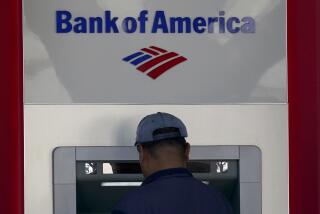Bank of America returns to profits as legal costs subside
- Share via
Bank of America returned to profitability in the first quarter as the bank was able to move beyond its legal troubles last year. However, the results came in short of some analysts’ estimates.
The consumer banking giant said Wednesday that it earned $2.98 billion after payments to preferred shareholders, compared with a loss of $514 million a year earlier. BofA’s net revenue fell to $21.2 billion compared with $22.56 billion in the same period a year earlier.
On a per-share basis the bank earned 27 cents, compared with a loss of 5 cents a year earlier.
The Charlotte, N.C.-based bank’s legal expenses, which stemmed largely from the housing bubble and financial crisis, appear to be largely behind it for the moment.
BofA’s legal costs for the quarter were $370 million, down slightly from the $393 million in legal expenses in the fourth quarter and a fraction of the $6 billion the bank paid out a year earlier. The $6 billion in expenses last quarter was the major driver of the company’s quarterly loss last year. The bank has paid out more than $70 billion in legal settlements since 2008.
BofA’s overall business continues to have issues. Revenue declined or was basically flat in all four of BofA’s core businesses: consumer banking, wealth management, global banking and global markets.
Consumer banking, the largest business by revenue, reported flat results in the quarter. Net revenue fell to $7.45 billion from $7.65 billion a year earlier.
The bank said lower credit card yields and credit card balances, as well as market-related adjustments to some debt securities, were the reason for the flat to lower quarter.
Low interest rates continue to hold back BofA’s profitability. Net interest income for the entire bank fell to $9.7 billion from $10.3 billion. BofA is more exposed to low interest rates than other banks. Since it is more focused on consumers, low interest rates means it cannot charge as much on loans. JPMorgan Chase or Goldman Sachs, which have large trading operations, have been largely able to offset that issue with higher earnings from trading stocks, bonds and other securities for large investors.
BofA, like other banks, did benefit from the volatility in financial markets last quarter. The bank’s foreign exchange trading revenue was the highest since BofA merged with Merrill Lynch in 2008, the bank said. However because BofA does not trade as much in currencies as other banks, the benefit wasn’t meaningful to the bank’s bottom line, BofA CFO Bruce Thompson said in a conference call with reporters.
“What we saw in (currencies) was very encouraging. We are looking to do more in rates and currencies,” Thompson said.
Bank of America’s results missed expectations. Financial analysts surveyed by FactSet expected 29 cents per share.
BofA’s shares fell two cents, or 0.2 percent, to $15.80 in early trading. The bank’s shares are down 12 percent this year alone, making it the biggest decliner among the major banks stocks.
More to Read
Inside the business of entertainment
The Wide Shot brings you news, analysis and insights on everything from streaming wars to production — and what it all means for the future.
You may occasionally receive promotional content from the Los Angeles Times.










